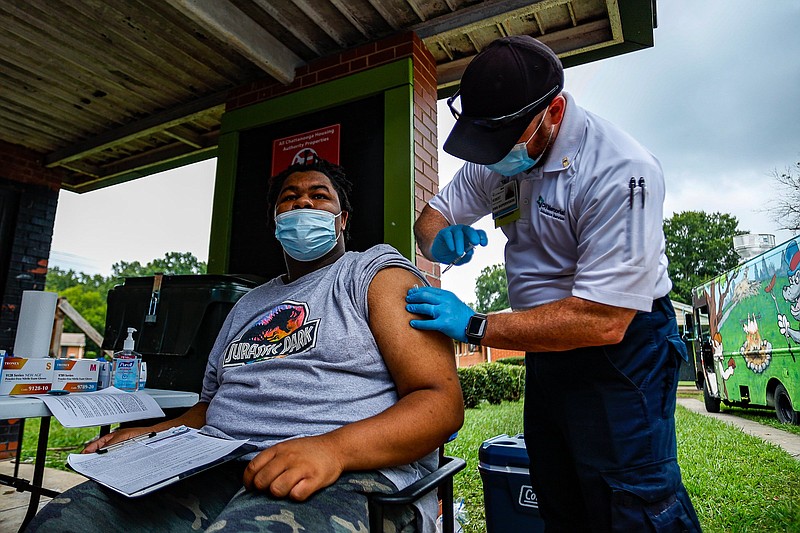The Hamilton County Health Department is encouraging fully vaccinated individuals with weakened immune systems who are now eligible for a COVID-19 vaccine booster to seek a third shot, as the department is preparing to open up boosters for all residents in about a month.
The new recommendation applies only to those who received their second dose of the Pfizer or Moderna COVID-19 vaccines four or more weeks ago and have immune-compromising conditions. That can include organ transplant recipients and those actively undergoing cancer treatment or taking high-dose steroid medication or other drugs that weaken the immune response.
Immune-compromised people typically don't mount as strong of a response to vaccines in general and could benefit from additional protection, according to a news release from the health department.
Health Department Administrator Becky Barnes said during a news briefing Friday that no proof is required to receive a third shot, and a full list of eligible conditions is available on the department's website. Individuals are encouraged to speak with their health care provider to decide if a booster is right for them, Barnes said.
"If you are one of those persons, I would encourage you to seek that third dose," she said, adding that the department is ramping up efforts to offer boosters to the general population sometime around Sept. 20.
"We will be ready as soon as that booster dose is authorized," Barnes said.
A booster recommendation could soon come for the single-dose Johnson & Johnson vaccine, but researchers are still in the process of gathering needed data, because the J&J vaccine is not as widely used and became available three months after the Pfizer and Moderna vaccines.
Pfizer and Moderna booster recommendations are based on data that suggest the vaccines' effectiveness wanes over time and may not be as strong against new variants of the virus as they were against earlier strains. However, experts say all three of the vaccines available in the United States are still doing a great job of preventing COVID-19 hospitalizations and deaths.
(READ MORE: Breakthrough COVID-19 cases are becoming more common. Here's what you need to know.)
Dr. Jensen Hyde, a hospitalist at Erlanger Medical Center who holds a master's degree in public health, said single-dose vaccines are "extremely uncommon" and the booster recommendation should not be viewed as an example of the vaccines failing. Most vaccines come in a series, and it was expected that boosters would eventually be needed for the COVID-19 vaccines, she said.
"We had such a great response from two doses of the mRNA vaccines [Pfizer and Moderna] that there was no evidence that you needed a third off the bat. But from the very, very beginning, we said we've got to watch this over time and we have to see what happens," Hyde said. "We're still not seeing rates of hospitalization and deaths suggesting that they are ineffective, just merely that a booster might be appropriate."
The booster shot should be from the same manufacturer as the first two doses of vaccines received, but if the prior mRNA vaccine product given is unknown, either the Pfizer or Moderna vaccine may be administered, according to the health department.
Providers offering specific COVID-19 vaccine brands can be found on the website vaccines.gov/search.
Contact Elizabeth Fite at efite@timesfreepress.com or follow her on Twitter @ecfite.
